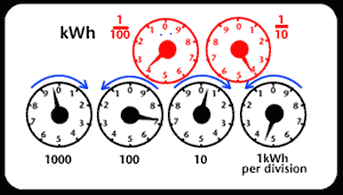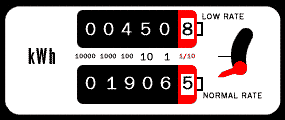Reading your meter
Need to read your meter? Learn about your meter type and how to send us an accurate reading.
Need to read your meter? Learn about your meter type and how to send us an accurate reading.
Electricity meters play a vital role in how energy use is measured, billed, and managed across homes, businesses, and public infrastructure. In New Zealand, there are three main types of meter installations, each suited to different needs.
This is the most common type of meter in homes and small businesses. It tracks your total electricity use over time - similar to a car’s odometer.
Some appliances like streetlights or traffic signals don’t have or need an electricity meter. Instead, their electricity use is estimated based on how long they run and how much power they use.
Common use cases: public lighting, signage, CCTV, and traffic systems.
How it works: Usage is calculated from known operating hours and wattage (e.g., a 30 watt streetlight running 10 hours a night).
Also referred to as Time of Use (ToU).
Used by larger businesses and industrial sites, these meters are built to handle high energy loads. Required for any site with capacity exceeding 500A.
Common use cases: Factories, supermarkets, and businesses with complex or high energy usage needs. A contract is required.
How it works: They record usage every 30 minutes and send it to us remotely. Billed in four-hour blocks.
If you have a smart meter and the main switch is turned on, you don’t need to send readings - it sends them to us automatically.
If it’s not communicating, the mains are turned off, or you have an older legacy meter, sending a reading helps keep your billing accurate and can also help us to estimate other months more accurately.
Legacy meters are usually read every second month. If a meter reader couldn’t access your meter, send us a reading and let us know if we need to update your access details.
Please be safe when you read your meter. Make sure you can reach it safely. If there are any loose or exposed wires in the cabinet, don't touch them - call an electrician as soon as possible.
If you cannot safely read your meter, let us know so we can schedule a meter reader to visit the property.
If you're charged different rates, such as one for night and one for day usage (night/day), you’ll need to send us a reading for each.
Your meter's screen will scroll through different information including:
On older meters, you might need to press a button (usually on the right) to scroll through each meter register.
Register readings are usually followed by kWh on the screen. If you do have more than one register, usually you can tell which is which by what shows on the left side of the screen (i.e., it might say "day").

In the example image shown, the reading is 9704.

Read the numbers from left to right, and ignore any red digits at the end.
If you'd like to submit a reading, please log in to your online tool here. If you are unsure of the reading, head to our contact us page and flick through a photo via email - we'll take care of the rest.